-

新人教版高中英语必修3Unit 4 Space Exploration-Reading and Thinking教学设计二
The theme of this unit focuses on “space exploration.” Students will learn about the training and experience needed to become an astronaut. The text is mainly about the development of space exploration. On the one hand, the text helps students to have a good understanding about the great feats humans have achieved, on the other hand, they will further understand the contributions that we Chinese have achieved, and feel confident and proud about our homeland and strengthen their love for our country. The teacher should instruct students to aim high and study harder to make great progress in the space career if possible.1. Read about the development and value of space exploration.2. Explore the mysteries of the universe and the achievements in space exploration.3. Skillfully use the vocabulary of this text to cultivate self-study ability 4. Develop cooperative learning ability through discussion.1. Enable the Ss to talk about the development and value of space exploration.2. Guide the Ss to summarize the main idea of each paragraph as well as the main idea of the text.3. Help Ss comprehend the main reasons for space exploration. Multi-media, textbook, notebooks.Step 1: Warming up and predictionLook at the title and the pictures of the text and predict what the text will be about?2. What are the main reasons for space exploration?

新人教版高中英语必修3Unit 4 Space Exploration-Reading for Writing教学设计二
⑦在我看来, 探索太空是值得的。As far as I am concerned, it is worthwhile to explore the space.Step 10 Writing---draftRecently, students in our class have had heated a discussion on whether space is worth exploring. Students hold different ideas about it.30% of us think space exploration is not worthwhile. They think space is too far away from us and our daily life and is a waste of money. And the money spent on space exploration can be used to solve the earth’s problems such as starvation and pollution.On the other hand,70% think space is worth exploring because we have benefited a lot from it,such as using satellites for communication and weather forecast. What’s more,with further space research,we may solve the population problem by moving to other planets one day. Also,space research will enable us to find new sources to solve the problem of energy shortages on the earth.As far as I am concerned, it is worthwhile to explore the space. Not only can it promote the development of society but also enrich our life. Step 11 Pair workExchange drafts with a partner. Use this checklist to help your partner revise his/her draft.1.Does the writer explain why he/she changed/wanted to change?2.Does the writer tell how the changes have improved or will improve his/her life?3.Is the text well-organised?4.Does the writer use words and expressions to show similarities and differences?5.Are there any grammar or spelling errors?6.Does the writer use correct punctuation?

新人教版高中英语必修3Unit 5 The Value of Money- Discovering Useful Structure教学设计
Step 3 Meaning1. 过去将来时表示从过去某一时间来看将要发生的动作或存在的状态, 常用在宾语从句中。一般由“would/should +动词原形”构成。She hoped that they would meet again someday. 她希望将来有一天他们能再见面。2. was/were going to+动词原形: 表示过去将要发生或很有可能发生的动作, 常用于口语中, 表示预言、意图或者打算等。He was going to start work the following week. 他打算下星期开始工作。3. was/were about to do: 常用来表示即将发生的动作, “刚要/正要做……”。注意该结构不与任何时间状语连用。I felt that something terrible was about to happen. 我感到某种可怕的事情即将发生。4.was/were to do: 表示“曾计划做某事”, 如果表示“本来计划做某事, 动作没实现”, 则需用 “was/were to have done”。She said she was to have told me about the accident. 她说她本来想告诉我关于事故的事。5.Start, go, come, leave, see, meet等动词的过去进行时: 表示就过去某一时刻而言即将发生的动作。She was coming later. 她随后就来。I had just put on my overcoat and was leaving to visit a friend of mine. 我刚穿上外套要去看我的一个朋友。

新人教版高中英语必修3Unit 5 The Value of Money-Listening &Speaking&Talking教学设计
4. A:We’d like to have someone to say a word at the beginning to welcome the group.B:↙Who?A:We thought that you or Dr.Johnson might do it.B用降调说Who,其意思是问,对方想让谁在开场时致欢迎词。Step 6 Pronunciation---Practice1. Listen to the short conversation and mark the intonation with ↗, ↙ or ↙, ↗. Then discuss with a partner what they intend to convey by using different intonation.Owner: You know what ?↗ It’s a million-pound bank note↙.Waiter 1: Really ?↗(question)Waiter 2: Really !↙(unbelievable and surprised)Waiter 3: Really ?!↙↗(first question then surprised)2. Listen to the conversations. Underline the parts that are stressed and mark the intonation. Then talk about the implied meanings of the responses with different intonations. Listen again and repeat.1) Henry: It’s a nice suit.Owner: Oh, it’s perfect!↙(The intonation means it is very suitable for Henry.)2) Henry: Well, that’s very kind of you.Owner: Kind, sir ?↗(what you said is not right) No, it’s kind of you. You must come whenever you want and have whatever you like. Just having you sit here is a great honour !!↙(welcome you to come again)3)Henry:Well, to be honest, I have none. Oliver:(happily) What luck!(excited) Brother↗, what luck!↙(It means “Didn’t you hear it?”)Henry: Well, it may seem lucky to you but not to me!↗(angry) If this is your idea of some kind of joke, I don’t think it’s very funny. Now if you’ll excuse me, I ought to be on my way.↙(If so, I would leave.)Roderick: Please don’t go↙...(hope Henry can wait for a moment)Part B Viewing and Talking---Describe people’s changing attitudes in a film clipStep 1 Before-listening---Tell the filmYou are going to watch part of the film The Million Pound Bank Note. Look at these photos and guess what happens in the film.

新人教版高中英语必修3Unit 5 The Value of Money-Listening &Speaking教学设计
Step 4: Listen again and decide if the following statements are true (T) or false (F).1 It was the first time Chen Liyan's story was reported. T口 F口2 Chen found 10,000 yuan in a small plastic bag in Taiyuan railway station口 F口3 Wang Zheng apologized to Chen because he couldn't offer her more money. T口 F口4 Chen took out a large loan to cure her daughter, T口 F口5 Wang set up a fundraising website for Chen's daughter after Chen told him about her situation. T口 F口Step 5:After listening, discuss the questions.1 What kind of person do you think Chen Liyan is?Chen Liyan is generous and honest because she returned a large sum of money to the owner.2 Did Chen return the money because she didn't need it?No. She returned the money because it was the right thing to do. Evidence for this is that she refused to accept the reward money because she felt that it had not been earned. 3 Is it common for people to do what Chen did?It depends on the culture. In some countries it is quite common to return money that has been found. In other countries, people believe "Finders are keepers!" 4 How did Wang Zheng feel about the return of his money?He must have been very happy and relieved to have gotten his money back. We know this because he thanked Chen repeatedly and even offered her a reward.5 Why did Ma Dongbao tell Wang about Chen's family?He must have had great sympathy for Chen and her daughter and wanted to help them.'We know this because he arranged help for them. 6 How did the news reporter feel about Chen's actions?The news reporter felt that it showed that money wasn't the most important thing in life. We know this because the reporter told us that this is what Chen believes. and then said, “that's a great attitude to take."

新人教版高中英语必修3Unit 5 The Value of Money-Reading and Thinking教学设计一
Everybody wants to get wealth.In today’s material world,making money or becoming wealthy symbolizes a person’s success and capability. Many people just make every effort, pay any price to attain greater wealth. With money,they can buy nice, large apartments in nice neighborhood. With money they can own luxurious cars. Wealth seems to bring all happiness in life.But is wealth the only road to happiness? Not really. There are many things in the world, which are beyond the means of money, such as friendship, love, health and knowledge. People are so preoccupied with struggling for money that they have no time or would not take the time to form or maintain friendship. What happiness can they feel living as lonely miserable creatures without love or friends in the world even if they accumulate tremendous wealth?In my opinion, people can’t do anything without money, but money is not everything. What money will bring you depends on your personal belief and goal in life. If you are kind enough to help others, especially the poor, money is a good thing to you. With it, you can do much more for the benefit of people and your country, and it will add to your own happiness. If you want money just for your own needs, you’ll never be satisfied or happy. In a word,you should have money spent for more people. Only then can money be the source of your happiness.Step 8 Homework4 students in a group, one acts Roderick, one Oliver, one servant and the fourth one acts Henry Adams, then listen to the tape, pay more attention to the difference between American English and British English in pronunciation, stress, tone.

新人教版高中英语必修3Unit 5 the value of money-Reading For Writing教学设计一
【参考范文】Narrator:(Henry is smiling as he leaves the restaurant. As he is walking down the street, he sees a sign for a place that cuts hair. He decides to get it cut. )H=Henry;B=Barber;R=rude manH:Good afternoon, I'd like to get a cut, if I may. (The barber looks at Henry's hair and continues cutting another man's hair. )Er, I'd really like a haircut. As you can see it's much too long. B:(in a rude manner) Yes, I can see that. Indeed, I can. H:Fine, well I'll have a seat then. (He sits in one of the barber's chairs. The barber turns to look at Henry. )B:It's quite expensive here, you know!Are you sure you can afford it?H:Yes. I think so. (In comes the rude man. )R:Hey you there. I need a haircut quickly. Can you do me straightaway?B:All right, then, get in the chair and I'll see what I can do. R:Thank you. (sits down in one of the barber's chairs)H:Excuse me, but I was here first. Aren't you going to do my hair first?B:This man's in a hurry. H:Well so am I!I insist that you cut my hair first. B:OK, but I'll have to be quick. This gentleman is waiting. H:Thank you. (They both become quiet. After his hair is cut, the barber tells Henry how much he must pay. Henry shows the barber the bank note. )B:Why, Mr . . . (looks shocked)H:Adams. Henry Adams. I'm sorry, I don't have any change. R:You're that Mr Adams! Well,I'm glad I waited or I might never have known it was you. B:Why, Mr Adams, please don't worry!(wearing a big smile) Nothing to worry about!Nothing at all!Please come back any time, even if you only need too little hairs cut!It will be my honour to serve you!
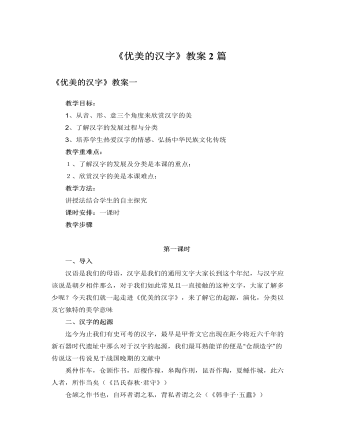
人教版高中语文必修1《优美的汉字》教案2篇
书法艺术的繁荣期,是从东汉开始的东汉时期出现了专门的书法理论著作,最早的书法理论提出者是东西汉之交的扬雄第一部书法理论专著是东汉时期崔瑗的《草书势》汉代书法家可分为两类:一类是汉隶书家,以蔡邕为代表一类是草书家,以杜度、崔瑗、张芝为代表,张芝被后人称之为“草圣”最能代表汉代书法特色的,莫过於是碑刻和简牍上的书法东汉碑刻林立,这一时期的碑刻,以汉隶刻之,字型方正,法度谨严、波磔分明此时隶书已登峰造极汉代创兴草书,草书的诞生,在书法艺术的发展史上有著重大意义它标志著书法开始成为一种能够高度自由的抒发情感,表现书法家个性的艺术草书的最初阶段是草隶,到了东汉时期,草隶进一步发展,形成了章草,后由张芝创立了今草,即草书
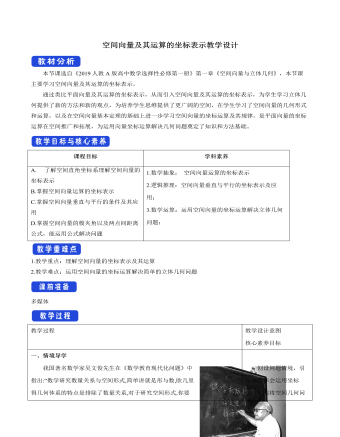
空间向量及其运算的坐标表示教学设计人教A版高中数学选择性必修第一册
一、情境导学我国著名数学家吴文俊先生在《数学教育现代化问题》中指出:“数学研究数量关系与空间形式,简单讲就是形与数,欧几里得几何体系的特点是排除了数量关系,对于研究空间形式,你要真正的‘腾飞’,不通过数量关系,我想不出有什么好的办法…….”吴文俊先生明确地指出中学几何的“腾飞”是“数量化”,也就是坐标系的引入,使得几何问题“代数化”,为了使得空间几何“代数化”,我们引入了坐标及其运算.二、探究新知一、空间直角坐标系与坐标表示1.空间直角坐标系在空间选定一点O和一个单位正交基底{i,j,k},以点O为原点,分别以i,j,k的方向为正方向、以它们的长为单位长度建立三条数轴:x轴、y轴、z轴,它们都叫做坐标轴.这时我们就建立了一个空间直角坐标系Oxyz,O叫做原点,i,j,k都叫做坐标向量,通过每两个坐标轴的平面叫做坐标平面,分别称为Oxy平面,Oyz平面,Ozx平面.
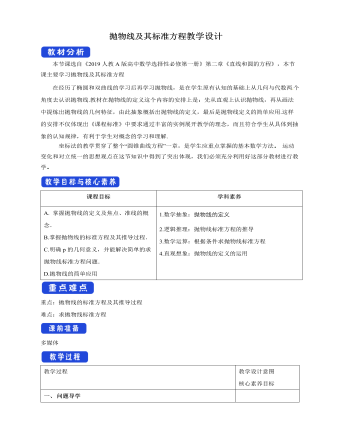
抛物线及其标准方程教学设计人教A版高中数学选择性必修第一册
本节课选自《2019人教A版高中数学选择性必修第一册》第二章《直线和圆的方程》,本节课主要学习抛物线及其标准方程在经历了椭圆和双曲线的学习后再学习抛物线,是在学生原有认知的基础上从几何与代数两 个角度去认识抛物线.教材在抛物线的定义这个内容的安排上是:先从直观上认识抛物线,再从画法中提炼出抛物线的几何特征,由此抽象概括出抛物线的定义,最后是抛物线定义的简单应用.这样的安排不仅体现出《课程标准》中要求通过丰富的实例展开教学的理念,而且符合学生从具体到抽象的认知规律,有利于学生对概念的学习和理解.坐标法的教学贯穿了整个“圆锥曲线方程”一章,是学生应重点掌握的基本数学方法 运动变化和对立统一的思想观点在这节知识中得到了突出体现,我们必须充分利用好这部分教材进行教学
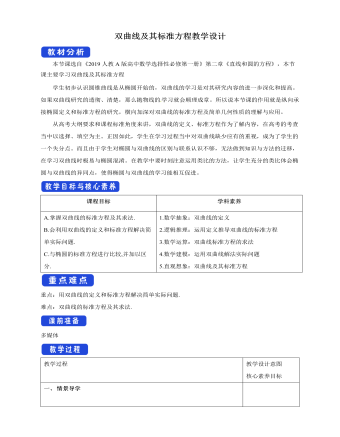
双曲线及其标准方程教学设计人教A版高中数学选择性必修第一册
∵在△EFP中,|EF|=2c,EF上的高为点P的纵坐标,∴S△EFP=4/3c2=12,∴c=3,即P点坐标为(5,4).由两点间的距离公式|PE|=√("(" 5+3")" ^2+4^2 )=4√5,|PF|=√("(" 5"-" 3")" ^2+4^2 )=2√5,∴a=√5.又b2=c2-a2=4,故所求双曲线的方程为x^2/5-y^2/4=1.5.求适合下列条件的双曲线的标准方程.(1)两个焦点的坐标分别是(-5,0),(5,0),双曲线上的点与两焦点的距离之差的绝对值等于8;(2)以椭圆x^2/8+y^2/5=1长轴的端点为焦点,且经过点(3,√10);(3)a=b,经过点(3,-1).解:(1)由双曲线的定义知,2a=8,所以a=4,又知焦点在x轴上,且c=5,所以b2=c2-a2=25-16=9,所以双曲线的标准方程为x^2/16-y^2/9=1.(2)由题意得,双曲线的焦点在x轴上,且c=2√2.设双曲线的标准方程为x^2/a^2 -y^2/b^2 =1(a>0,b>0),则有a2+b2=c2=8,9/a^2 -10/b^2 =1,解得a2=3,b2=5.故所求双曲线的标准方程为x^2/3-y^2/5=1.(3)当焦点在x轴上时,可设双曲线方程为x2-y2=a2,将点(3,-1)代入,得32-(-1)2=a2,所以a2=b2=8.因此,所求的双曲线的标准方程为x^2/8-y^2/8=1.当焦点在y轴上时,可设双曲线方程为y2-x2=a2,将点(3,-1)代入,得(-1)2-32=a2,a2=-8,不可能,所以焦点不可能在y轴上.综上,所求双曲线的标准方程为x^2/8-y^2/8=1.

新人教版高中英语必修3Unit 5 The Value of Money-Discovering Useful Structures导学案
4.They were going to find someone to take part in their bet when they saw Henry walking on the street outside.[归纳]1.过去将来时的基本构成和用法过去将来时由“would+动词原形”构成,主要表示从过去某一时间来看将要发生的动作(尤其用于宾语从句中),还可以表示过去的动作习惯或倾向。Jeff knew he would be tired the next day.He promised that he would not open the letter until 2 o'clock.She said that she wouldn't do that again.2.表示过去将来时的其他表达法(1)was/were going to+动词原形:该结构有两个主要用法,一是表示过去的打算,二是表示在过去看来有迹象表明将要发生某事。I thought it was going to rain.(2)was/were to+动词原形:主要表示过去按计划或安排要做的事情。She said she was to get married next month.(3)was/were about to+动词原形:表示在过去看来即将要发生的动作,由于本身已含有“即将”的意味,所以不再与表示具体的将来时间状语连用。I was about to go to bed when the phone rang.(4)was/were+现在分词:表示在过去看来即将发生的动作,通常可用于该结构中的动词是come,go,leave,arrive,begin,start,stop,close,open,die,join,borrow,buy等瞬间动词。Jack said he was leaving tomorrow.
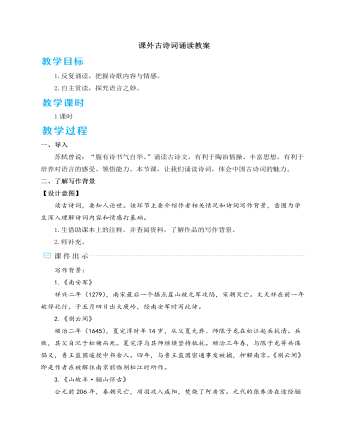
人教部编版语文九年级下册课外古诗词诵读(1)教案
《朝天子·咏喇叭》:这篇散曲借咏喇叭,讽刺和揭露了明代宦官作威作福、鱼肉百姓的罪恶行径,表达了对宦官专横跋扈、趾高气扬嘴脸的强烈憎恶之情。(2)根据上面的分析,适当运用轻重音、升降调等朗读技巧,有感情地反复朗读。(3)这几首诗词曲中,你最喜欢哪几句?说说你喜欢的理由,而后有感情地诵读。预设 【示例一】我喜欢“山河千古在,城郭一时非”。这两句以祖国山河万世永存与城郭一时沦陷进行对比,突出诗人对收复大宋江山的信念和对元人的蔑视。【示例二】我喜欢“无限山河泪,谁言天地宽”。从这两句我感受到了作者的满腔悲愤。作者一直盼望明王朝东山再起,可时运不济,命运多舛,恢复国土、重整山河的宏愿一次次落空,令作者感到深深的失望。【示例三】我喜欢“赢,都变做了土;输,都变做了土”。这两句揭示了深刻的道理,意为国家间无论怎样争斗,终究会在历史的长河中渐渐湮灭,在无尽的沧桑中被遗忘,化为沉寂的黄土。经过前面的诵读、品读环节,学生们对这几首诗词已经有了了解,再安排学生背诵,可以使学生印象更深。
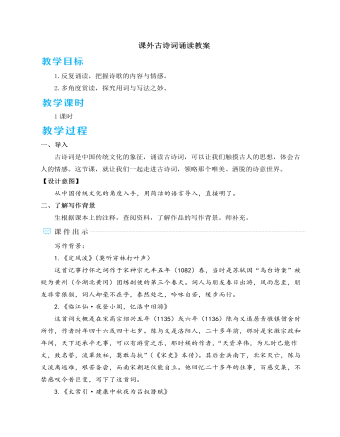
人教部编版语文九年级下册课外古诗词诵读(2)教案
【示例二】我喜欢“斫去桂婆娑,人道是,清光更多”。这里的“桂婆娑”指带给人民黑暗的婆娑桂影,它不仅包括南宋朝廷内外的投降势力,也包括了金人的势力。作者在这一句中,运用神话传说,以超现实的奇思妙想,表达渴望扫除黑暗,让光明普照人间的愿望。【设计意图】在这一环节,引导学生先理解词作的意思和情感再诵读,加深学生对词作的印象,提升学生对词作的诵读感悟能力。五、反复诵读,默写诗词1.学生独立背诵。2.同桌互相检查背诵。3.开展背诵比赛。4.集体默写四首词。结束语:诵读古诗词,可以陶冶我们的情操,激发我们的想象力,与古人对话。希望同学课下能自主阅读一些经典古诗词,在感受它们魅力的同时提升我们的文学素养。【设计意图】在前面几个环节,学生已经从不同层次诵读了四首词,对这四首词有了一定的理解。本环节让学生在此基础上用不同方式背诵,加深记忆。
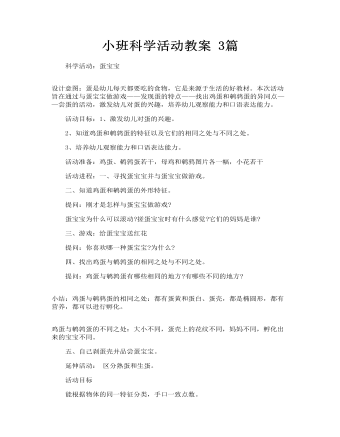
小班科学活动教案 3篇
二、知道鸡蛋和鹌鹑蛋的外形特征。 提问:刚才是怎样与蛋宝宝做游戏? 蛋宝宝为什么可以滚动?搓蛋宝宝时有什么感觉?它们的妈妈是谁? 三、游戏:给蛋宝宝送红花 提问:你喜欢哪一种蛋宝宝?为什么?
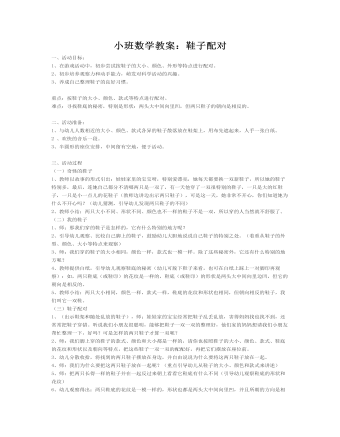
小班数学教案
2、初步培养观察力和动手能力,萌发对科学活动的兴趣。 3、养成自己整理鞋子的良好习惯。 重点:按鞋子的大小、颜色、款式等特点进行配对。 难点:寻找鞋底的秘密,特别是形状:两头大中间向里凹,但两只鞋子的朝向是相反的。 二、活动准备: 1、与幼儿人数相近的大小、颜色、款式各异的鞋子散落放在鞋架上,用布先遮起来,人手一张白纸。 2 、欢快的音乐一段。 3、半圆形的座位安排,中间留有空地,便于活动。 三、活动过程 (一)奇怪的鞋子 1、教师以故事的形式引出:娃娃家里的宝宝呀,特别爱漂亮,她每天都要换一双新鞋子,所以她的鞋子特别多,最后,连她自己都分不清哪两只是一双了,有一天他穿了一双很特别的鞋子,一只是大的红鞋子,一只是小一点儿的花鞋子(教师边讲边出示两只鞋子),可是这一天,她非常不开心,你们知道她为什么不开心吗?(幼儿猜测,引导幼儿发现两只鞋子的不同) 2、教师小结:两只大小不同、形状不同、颜色也不一样的鞋子不是一双,所以穿的人当然就不舒服了。 (二)我的鞋子 1、师:那我们穿的鞋子是怎样的,它有什么特别的地方呢? 2、引导幼儿观察、比较自己脚上的鞋子,鼓励幼儿大胆地说说自己鞋子的特别之处。(着重从鞋子的外型、颜色、大小等特点来观察) 3、师:我们穿的鞋子的大小相同,颜色一样,款式也一模一样。除了这些秘密外,它还有什么特别的地方呢?
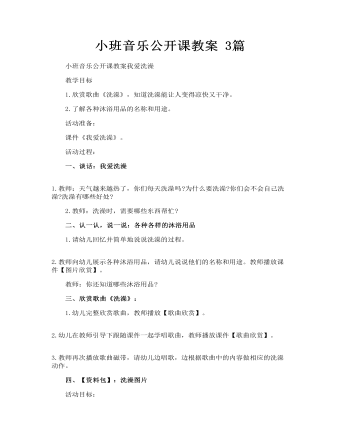
小班音乐公开课教案 3篇
一、谈话:我爱洗澡 1.教师:天气越来越热了,你们每天洗澡吗?为什么要洗澡?你们会不会自己洗澡?洗澡有哪些好处? 2.教师:洗澡时,需要哪些东西帮忙? 二、认一认,说一说:各种各样的沐浴用品 1.请幼儿回忆并简单地说说洗澡的过程。 2.教师向幼儿展示各种沐浴用品,请幼儿说说他们的名称和用途。教师播放课件【图片欣赏】。 教师:你还知道哪些沐浴用品?
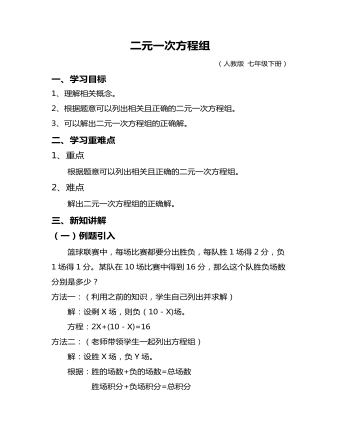
初中数学人教版二元一次方程组教学设计教案
(一)例题引入篮球联赛中,每场比赛都要分出胜负,每队胜1场得2分,负1场得1分。某队在10场比赛中得到16分,那么这个队胜负场数分别是多少?方法一:(利用之前的知识,学生自己列出并求解)解:设剩X场,则负(10-X)场。方程:2X+(10-X)=16方法二:(老师带领学生一起列出方程组)解:设胜X场,负Y场。根据:胜的场数+负的场数=总场数 胜场积分+负场积分=总积分得到:X+Y=10 2X+Y=16
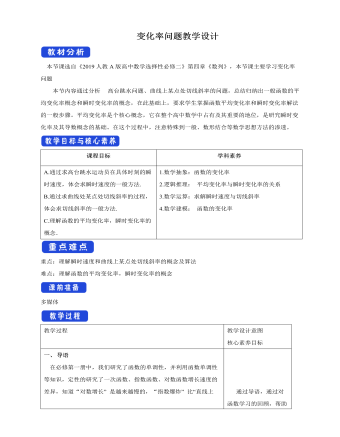
人教版高中数学选择性必修二变化率问题教学设计
导语在必修第一册中,我们研究了函数的单调性,并利用函数单调性等知识,定性的研究了一次函数、指数函数、对数函数增长速度的差异,知道“对数增长” 是越来越慢的,“指数爆炸” 比“直线上升” 快得多,进一步的能否精确定量的刻画变化速度的快慢呢,下面我们就来研究这个问题。新知探究问题1 高台跳水运动员的速度高台跳水运动中,运动员在运动过程中的重心相对于水面的高度h(单位:m)与起跳后的时间t(单位:s)存在函数关系h(t)=-4.9t2+4.8t+11.如何描述用运动员从起跳到入水的过程中运动的快慢程度呢?直觉告诉我们,运动员从起跳到入水的过程中,在上升阶段运动的越来越慢,在下降阶段运动的越来越快,我们可以把整个运动时间段分成许多小段,用运动员在每段时间内的平均速度v ?近似的描述它的运动状态。
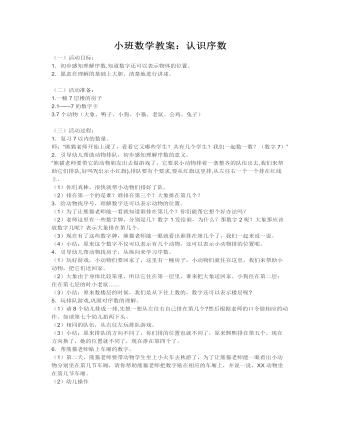
小班数学教案:认识序数
(二)活动准备: 1.一幢7层楼的房子 2.1——7的数字卡 3.7个动物(大象、鸭子、小狗、小猫、老鼠、公鸡、兔子) (三)活动过程: 1.复习7以内的数量。 师:“熊猫老师开始上课了,看看它又哪些学生?共有几个学生?我们一起数一数?(数字7)” 2.引导幼儿帮助动物排队,初步感知理解序数的意义。 “熊猫老师要带它的动物朋友出去做游戏了,它要求小动物排着一条整齐的队伍出去,我们来帮助它们排队,好吗?(出示小红旗),排队要有个要求,要从红旗这里排,从左往右一个一个排在红线上。 (1)你们真棒,很快就帮小动物们排好了队。 (2)排在第一个的是谁?谁排在第三个?大象排在第几个?



